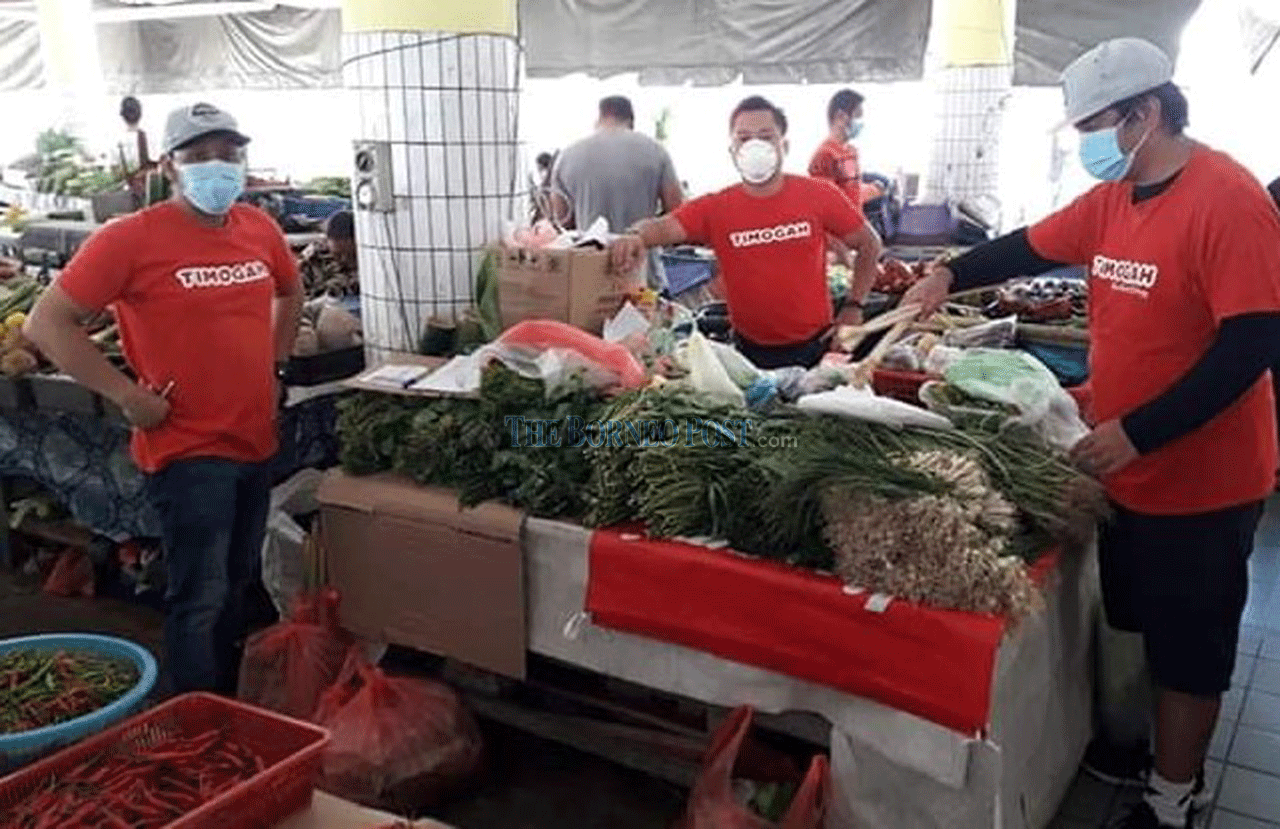
Collecting fish from his supplier at Medan Niaga Satok.
A FEW years ago, Heineken Laluan decided to take the plunge into a new career path.
He quit his job as a full-time teacher at SMK Chung Hua Miri to pursue his dream of having his own business.
Starting a new career from scratch, let alone a business, can be a pretty daunting task but he was determined to make it in the business world.
“I’ve always dreamt of building an e-commerce technology company much like Amazon and Alibaba for the benefit and convenience of consumers.
“So when I quit my job, I was determined to remain committed to pursuing my entrepreneurial dream,” he told thesundaypost.

Heineken (second left) and his team at Startup Istanbul 2019 in Turkey where Timogah was selected as one of the Top 100 Startups.
Heineken, from Kampung Tematu in Bau, had ventured into various businesses. One day, he got the idea of setting up an e-marketplace selling fresh produce from Sarawak.
“I discovered that Sarawak, or Borneo rather, has a lot of natural fresh produce that is high in demand but the potential of this market remains largely untapped.
“Most of this fresh produce is grown by small rural farmers, who face challenges such as logistics and limited space to sell their products besides not earning a fair profit margin,” he noted.
E-market launched
After months of research, Heineken launched Timogah (which means famous in Bidayuh) in July 2018, an e-marketplace whereby customers could order fresh and quality agriculture products, including local crops and jungle produce, complete with delivery.
He faced some setbacks at first. As with most new businesses, things got off to a slow start despite the high demand for fresh local produce.
“When Timogah was first launched, customers were quite reluctant to order through the website as they preferred WhatsApp and Facebook.

Delivering a customer’s order.
“Our sales were very low but by 2019, Timogah started to have regular customers,” he recalled.
According to Heineken, what makes Timogah unique is that the business has been purpose-designed to connect small rural farmers and small retailers with customers in Sarawak with logistics at both ends managed by the company.

Heineken (right) with Cosmas, a jungle-produce gatherer from Kampung Kuang, in Siburan.
“We replenish our supply by dealing directly with small farmers and the rural communities in the selection and collection of their products.
“When customers order and make payments on Timogah, the goods are packaged and delivered by our delivery team right to their doorsteps.
“In this regard, I suppose you can also say we double as an agriculture e-hailing platform,” he said.
Better future
By reaching out to small farmers and rural communities, Heineken hoped he could help them improve their incomes and lives, while also providing consumers with direct access to fresh produce and rural products.
“We’ve reached out to small farmers from Samarahan, Serian, Padawan, Siburan, Bau, and Lundu. In Siburan, we have a featured farmers’ community from Kampung Kuang.
“They will collect and supply around 300kg to 500kg of bamboo shoots each week to meet our customers’ demand.”

Heineken (right) with his team after collecting the bamboo shoots from his supplier.
He revealed Timogah is also collaborating with small traders from four major markets in Kuching to help them sell and increase their daily income online.
From as a small startup with sporadic weekly orders, Timogah has emerged as a fast-growing agriculture supply chain operator in Kuching with its own e-marketplace platform that manages more than 80 consistent orders daily.
It has also achieved several accolades, including selection as one of the Top 100 Startups in Startup Istanbul 2019 in Turkey and recognition by the Sarawak Multimedia Authority (SMA) as one of the promising local technology startups.
The e-marketplace has also grown increasingly popular among farmers and consumers during the Covid-19 lockdown.
“I hope to keep the local food supply chain alive through Timogah, which not only provides consumers and sellers with a safe place to trade but also helps reduce wastage of farmers’ produce,” Heineken said.
He encouraged more small farmers and rural communities to trade online at Timogah’s e-marketplace.
Less travelled path
On whether Timogah is open to business-to-business (B2B) trade, Heineken said he is currently focusing on developing the e-marketplace.

Heineken’s team collects local produce at the Mile 7 wet market.
“We could have chosen the conventional way, which is more familiar and predictable but instead taken the less travelled path because we know along with it, there’re small farmers and rural communities we can support via our Timogah.com platform. Even if it’s only one farmer, we believe in making a difference.”
Besides developing the Timogah mobile app, he hoped to reach out to more small rural farmers and expand the market from Kuching to other districts in Sarawak.
“Timogah is built on small success stories by unsung heroes. We learn and grow from those stories and hope one day Timogah can stand tall in the eyes of the world, share our story, and make Sarawak really proud,” he added.
